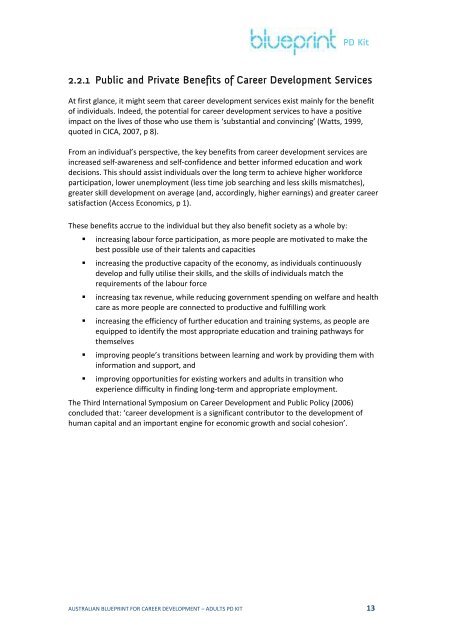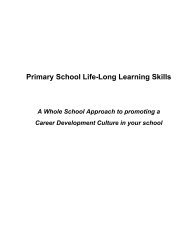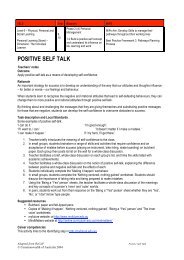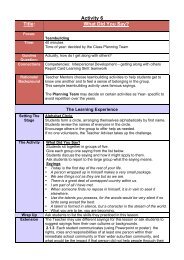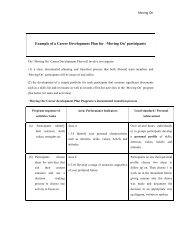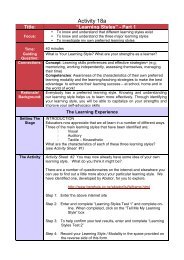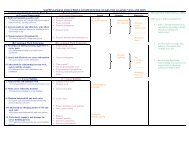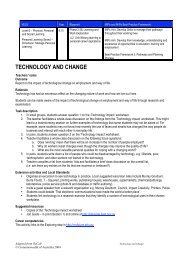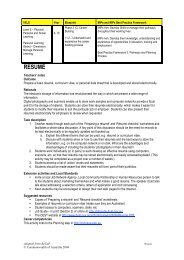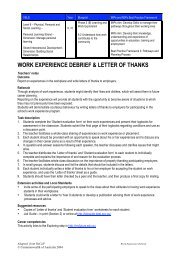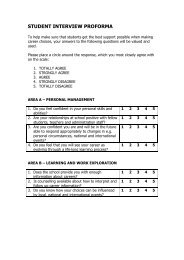Re-write of case studies - Blueprint - Australian Blueprint for Career ...
Re-write of case studies - Blueprint - Australian Blueprint for Career ...
Re-write of case studies - Blueprint - Australian Blueprint for Career ...
You also want an ePaper? Increase the reach of your titles
YUMPU automatically turns print PDFs into web optimized ePapers that Google loves.
PD Kit<br />
2.2.1 Public and Private Benefits <strong>of</strong> <strong>Career</strong> Development Services<br />
At first glance, it might seem that career development services exist mainly <strong>for</strong> the benefit<br />
<strong>of</strong> individuals. Indeed, the potential <strong>for</strong> career development services to have a positive<br />
impact on the lives <strong>of</strong> those who use them is ‘substantial and convincing’ (Watts, 1999,<br />
quoted in CICA, 2007, p 8).<br />
From an individual’s perspective, the key benefits from career development services are<br />
increased self-awareness and self-confidence and better in<strong>for</strong>med education and work<br />
decisions. This should assist individuals over the long term to achieve higher work<strong>for</strong>ce<br />
participation, lower unemployment (less time job searching and less skills mismatches),<br />
greater skill development on average (and, accordingly, higher earnings) and greater career<br />
satisfaction (Access Economics, p 1).<br />
These benefits accrue to the individual but they also benefit society as a whole by:<br />
• increasing labour <strong>for</strong>ce participation, as more people are motivated to make the<br />
best possible use <strong>of</strong> their talents and capacities<br />
• increasing the productive capacity <strong>of</strong> the economy, as individuals continuously<br />
develop and fully utilise their skills, and the skills <strong>of</strong> individuals match the<br />
requirements <strong>of</strong> the labour <strong>for</strong>ce<br />
• increasing tax revenue, while reducing government spending on welfare and health<br />
care as more people are connected to productive and fulfilling work<br />
• increasing the efficiency <strong>of</strong> further education and training systems, as people are<br />
equipped to identify the most appropriate education and training pathways <strong>for</strong><br />
themselves<br />
• improving people’s transitions between learning and work by providing them with<br />
in<strong>for</strong>mation and support, and<br />
• improving opportunities <strong>for</strong> existing workers and adults in transition who<br />
experience difficulty in finding long-term and appropriate employment.<br />
The Third International Symposium on <strong>Career</strong> Development and Public Policy (2006)<br />
concluded that: ‘career development is a significant contributor to the development <strong>of</strong><br />
human capital and an important engine <strong>for</strong> economic growth and social cohesion’.<br />
AUSTRALIAN BLUEPRINT FOR CAREER DEVELOPMENT – ADULTS PD KIT 13


